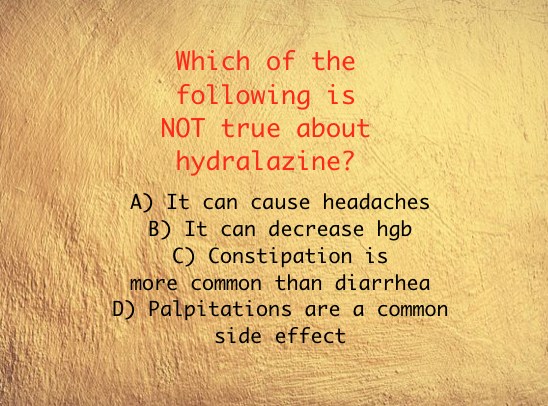If you work in a hospital you are likely familiar with doing medication reconciliations. Nurses often call me asking to restart patients’ home medications. There are many questions that I like to ask before restarting medications.When I am called I often ask about the patient’s current lab values, medical history, and/or current diagnoses. This information helps me to determine if the medications are appropriate to restart for that particular patient.
I compiled a list of some medications that I am very cautious when restarting. Listed below are also some questions that I might ask to help me decide if the medication is appropriate before restarting that particular medication. The list also includes some rationales as well. Hope this helps!
- “Statins” (HMG-CoA reductase inhibitors)
- Examples: simvastatin, pravastatin, atorvastatin
- Questions that might be asked before restarting:
- What are the liver enzymes (AST/ALT)?
- Rationale: Statins can elevated liver enzymes
- What is the renal function?
- Rationale: Statins need to be used very cautiously if a patient has renal failure. If it is new renal failure, the next question you might ask is- what is the CK level. CK is high in rhabdomyolysis.
- Is there a CK level and is it high?
- Rationale: As mentioned above, this can indicate rhabdo. This is particularly important if the patient has had a recent fall, crush injury, myalgia, tea colored urine, and or altered mental status. “Statins” can cause rhabdomyolysis.
- What are the liver enzymes (AST/ALT)?
- Warfarin
- Questions that might be asked before restarting:
- Why are they on the Warfarin?
- Rationale: Lets say that the patient is on it for a recent heart valve replacement. We wouldn’t want to stop a blood thinner if the patient had a recent heart valve replacement. It does become a bit tricky when the patient also has a GI bleed or other areas of bleeding. This is when a cardiology consult would be appropriate to help manage this.
- What is their hemoglobin?
- Rationale: It is important to know the baseline hemoglobin for a patient on any anticoagulant. If there is a big drop, investigation needs to happen further to determine if their is a bleed.
- What was the last INR?
- Rationale: Depending on the indication for the anticoagulant, there are different therapeutic range goals for different indications. Ex: Heart valves 2.5-3.5, Atrial fibrillation 2-3. (1)
- Does the patient have any bleeding?
- Coumadin will most likely need to be held
- Has the patient have any dark stools?
- Rationale: This can be a sign of an upper GI bleed
- Has the patient been dizzy or had low blood pressure?
- Rationale: Dizziness and or hypotension can be a sign of low hemoglobin/anemia
- Why are they on the Warfarin?
- Questions that might be asked before restarting:
- Are there any procedures planned within the next 24-48 hours. Blood thinners generally need to be held before procedures
- Metformin
- Questions that might be asked before restarting:
- What is the lactic acid level?
- Rationale: Metformin can cause lactic acidois
- Is the creatinine elevated (cr >1.4)?
- Rationale: There have been some changes in recent years that have allowed for more lenient guidelines of metformin use in renal failure. But I am still very cautious about using/restarting metformin in anyone with creatinine over 1.4. (2)
- Any recent contrast used during imaging?
- Rationale: Metformin should be held for 48-72 hours after contrast has been given with imaging
- Any recent diarrhea?
- Rationale: Metformin can cause gastrointestinal upset
- What is the lactic acid level?
- Questions that might be asked before restarting:
- Ace inhibitors
- Examples: Lisinopril, Enalapril, quanipril, ramipril
- Questions that might be asked before restarting:
- What is the potassium?
- Rationale: Ace Inhibitors can cause hyperkalemia
- Is the patient on potassium?
- Rationale: We may want to consider holding the potassium if the patient is borderline high potassium and or has new renal failure
- Does the patient have renal failure?
- What is the potassium?
- Beta blockers
- Examples: Labetelol, metoprolol
- Questions that might be asked before restarting:
- Do they have COPD or asthma?
- Rationale: Beta blockers can cause bronchospasm
- What is the patient’s heart rate?
- Rationale: Beta blockers often cause bradycardia.
- Is the patient a diabetic and had hypoglycemia recently?
- Rationale: Beta blockers can mask the signs and symptoms of hypoglycemia. This is extremely important to know this especially if you are taking care of a patient who has hypoglycemia and or newly started beta blocker with diagnosis of diabetes. May need to monitor blood glucose more often. (5)
- Do they have COPD or asthma?
- Narcotics
- Examples: Norco, Percocet, morphine, dilaudid
- Questions that might be asked before restarting:
- Did the patient come in with altered mental status and or sedated?
- Rationale: Narcotics can make the patient more sedated. Also if the patient is receiving too many narcotics, this may be contributing to their altered mentation. This is definitely something to consider in the list of differential diagnosis.
- Is there new renal failure?
- Rationale: Often medication effects can accumulate in renal failure. The main concern is respiratory depression.
- When did they last have narcotics?
- Rationale: We don’t want to give a dose too soon and or unnecessarily
- What and where is their pain? Is this new or chronic?
- Rationale: Although you don’t want to abruptly stop narcotics with chronic use (withdrawal)- a decrease in dose may be necessary. Be aware of withdrawal symptoms as these are often overlooked
- Rationale: The other thing to be aware of is that if it is new pain…we don’t want to simply mask it and ignore it. If it is severe abdomen pain we would want to get abdomen imaging.
- Did the patient come in with altered mental status and or sedated?
REFERENCES:
1) A review of Warfarin dosing & monitoring https://www.fda.gov/drugs/drugsafety/ucm493244.htm
2) FDA Drug Safety Communication: FDA revises warnings regarding use of the diabetes medicine metformin in certain patients with reduced kidney function https://www.fda.gov/drugs/drugsafety/ucm493244.htm
3) Renal Considerations in Angiotensin Converting Enzyme Inhibitor Therapy http://circ.ahajournals.org/content/104/16/1985
4) ACE inhibitors and the kidney. A risk-benefit assessment. https://www.ncbi.nlm.nih.gov/pubmed/8879974
5) Hypoglycemic Unawareness, By Dr Ananya Mandal, MD https://www.news-medical.net/health/Hypoglycemic-Unawareness.aspx




